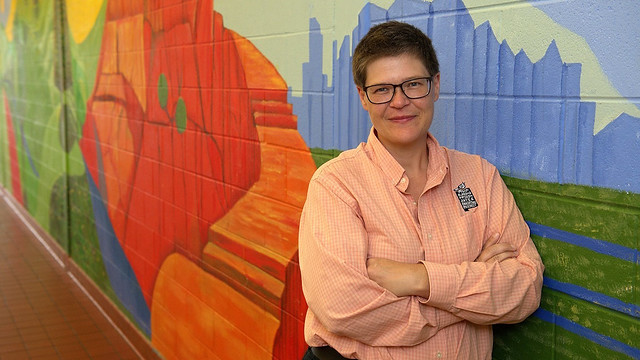Alabama Prison Arts + Education Project founder receives Governor’s Arts Award
Article body
Auburn University’s Kyes Stevens, founder and director of the Alabama Prison Arts + Education Project, has been named a recipient of the Alabama State Council on the Arts’ Governor’s Arts Award. She will be honored at the “Celebration of the Arts” awards ceremony on Wednesday, May 22, in Montgomery.
The Governor’s Arts Award honors individuals who have made unique contributions to the arts in Alabama. As director of the Alabama Prison Arts + Education Project, Stevens leads continuing education and college credit courses in the arts and sciences for people incarcerated in Alabama prisons.
“This award is not just an honor and recognition for me,” Stevens said. “It is for all the people who have worked so hard—the students, teachers and the administrative team. The honor means that the people who participate in our programming matter.”
Stevens passionately advocates for the role of higher education in criminal justice reform.
“The Alabama Prison Arts + Education Project opens doors. Fundamentally, it is a program about building access to arts and learning because these are vital to human existence. Art feeds all the souls. I also believe Alabama is worth it. We think that people in every corner of the state deserve access to arts and learning,” said Stevens, who is also a published poet and educator.
Barb Bondy, a professor in the Department of Art and Art History in Auburn’s College of Liberal Arts, nominated Stevens for the award. Bondy has taught a number of classes with the prison arts project since 2005.
“Stevens’ life work, in all endeavors, eases the suffering of others, cultivates hope, particularly in prisons where there is none, and develops potential and self-worth in those who are neglected and marginalized,” Bondy said. “Compassion, empathy and insight are reflected in Stevens’ poetry and are at the core of APAEP’s goal to offer the opportunity to incarcerated people in Alabama to see themselves as students, to learn, to reflect, to thrive with access to arts and education.”
Stevens said she’s always had a bigger goal for the program than just educating incarcerated students—she believes, through the program, she can make Alabama better.
“Since inception, I have believed in something that is hard to fully explain about this program, our students, our role in the state and nation—but the end result is a more compassionate Alabama,” she said. “Learning and creating helps us see humanity—all of it. I work toward that daily—the long term vision for this program, against myriad obstacles and doubters. But when you believe in something like I believe in our students, the extraordinary can happen.”
Since 2002, the Alabama Prison Arts + Education Project has served approximately 5,000 students through 6,624 classroom hours in 12 of Alabama’s 15 major prisons. The program encompasses 243 pre-college and college classes in men’s and women’s facilities with expanded curriculum in the arts, humanities, sciences and math, using more than 1175 artists, writers, visiting teachers, graduate student fellows and faculty members representing four universities in Alabama.
Reading libraries are established in 18 prisons and transitional facilities in Alabama, filled with 23,000 donated books. A touring exhibition, “Art on The Inside” is composed of artwork by APAEP students and has traveled to multiple states. Ten anthologies have been published featuring the poetry, creative writing and art by APAEP students.
Classes have been sustained through grants from more than 15 funding bodies and through numerous donations from individuals and sales of APAEP student-donated artwork. The bachelor’s degree has been made possible with support from the Second Chance Pell Pilot Program, the Andrew W. Mellon Foundation, the Hearst Foundation and the Mike and Gillian Goodrich Foundation. APAEP now has an administrative team led by Stevens that includes two program coordinators, an office administrator and a re-entry specialist.
Related Media
Media interested in this story can contact Communications Director Preston Sparks at (334) 844-9999 or preston.sparks@auburn.edu.
Auburn University is a nationally ranked land grant institution recognized for its commitment to world-class scholarship, interdisciplinary research with an elite, top-tier Carnegie R1 classification, life-changing outreach with Carnegie’s Community Engagement designation and an undergraduate education experience second to none. Auburn is home to more than 30,000 students, and its faculty and research partners collaborate to develop and deliver meaningful scholarship, science and technology-based advancements that meet pressing regional, national and global needs. Auburn’s commitment to active student engagement, professional success and public/private partnership drives a growing reputation for outreach and extension that delivers broad economic, health and societal impact.





